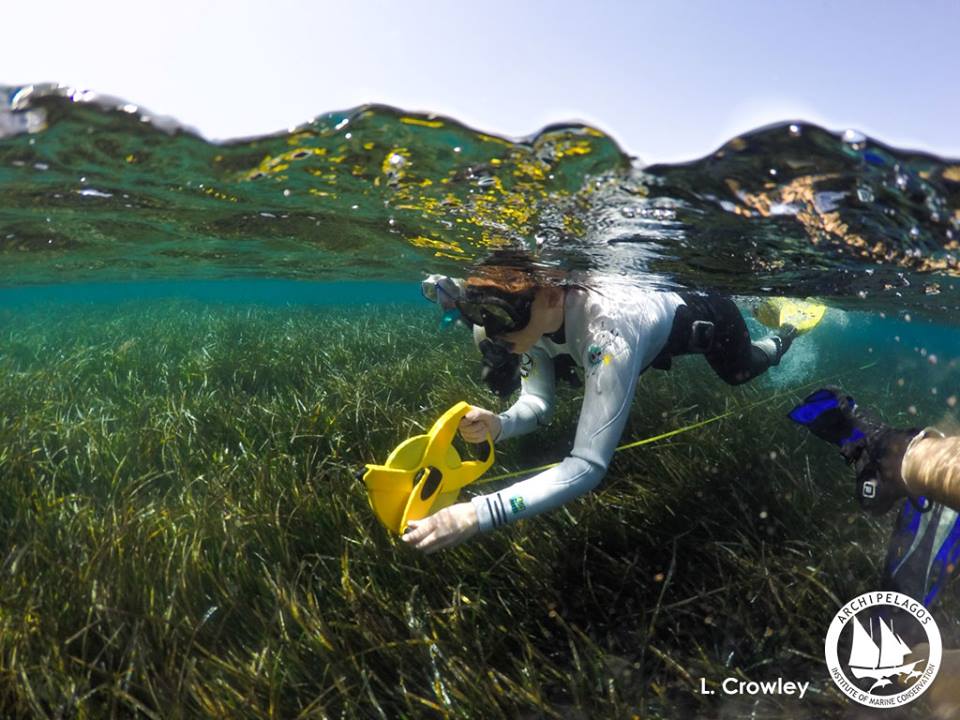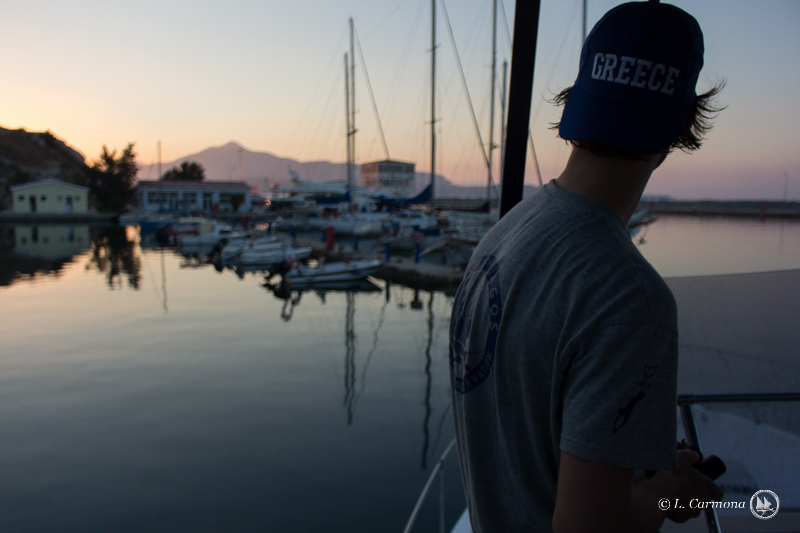Anastasia Miliou, Scientific Director of Archipelagos Institute of Marine Conservation, based in the Eastern Aegean islands in Greece, recently spoke with The National Herald about the Institute’s mission and current projects.
TNH: Please give us an overview of the Archipelagos Institute. Briefly describe, generally, what you do.
AM: Archipelagos Institute of Marine Conservation is a nonprofit, non-governmental organization committed to researching and defending the biodiversity of the Greek seas and islands; as well as the entire eastern Mediterranean Sea. Since 1998, Archipelagos has focused on a combination of multidisciplinary scientific research in cooperation with leading universitiesfrom all overthe world, with unique conservation work that local communities play an active part. This cooperation creates a strategic foundation that enables and strengthens the conservation actions of Archipelagos at a local, national and European level, which is allowing usto protect aquatic and terrestrial life against the increasing human impacts on our natural environment.
Archipelagos operates far from city centers and commercial interests; offering a pure, direct approach to environmental conservation. Our international research team work in various locations across the Greek seas throughout the year, being based next to the ecosystems that are in need of protection. This approach gives our staff and students a rare and exclusive opportunity in conservation, with primarily field based projects. In this way we manage to implement significant research and environmental conservation activities, thanksto the enthusiasm and dedication of our research team.
We Use Our Scientific Knowledge to:
• Cooperate with local communities and authorities for the development and application of pilot management and conservation projects aimed at protecting habitats and species.
• Work directly to stop destructive human behavior, such as illegal fishing practices, explosions at sea, waste dumping, maritime pollution, erosive overgrazing,smuggling of wildlife and otherthreats to biodiversity.
• Launch environmental actions and awareness campaigns at local, national and international levels through the use of social media, video, animation and printed media in order to inform the public on how to better preserve and actively protect its natural resources.
TNH: From where around the world do your students come?
AM: Archipelagos brings together the expertise and knowledge of international scientific conservation community, aiming to protect the unique biodiversity of the Greek seas and islands. We provide opportunitiesforstudents,recent graduates and scientists from all over the world, to acquire multidisciplinary, practical experience through work placements and field courses. Since 2001, we have hosted over 2,500 students and scientists from different parts of the world. At the moment most students come from Europe, but we also host many from North America, Australia and Asia. Over the next few years we aim to strengthen ourlinks with North American universities and organizations, so that more students and scientists will become involved in Archipelagos’ research and conservation efforts. Teams are comprised of people with wide range of specialties and skills, related to environmental, terrestrial and marine sciences, but we also focus on complementary fields such as law, multimedia, journalism, documentary production and many more, which are vital in strengthening our conservation efforts.
TNH: What are the field courses/ study abroad programs you offer?
AM: Our field courses offer to the students the chance of gaining practical hands-on experience, working for priority conservation projects. When a group from a university or school is interested in joining Archipelagos, we work together with the academics or teachers to create a course program based on the interests and scientific background specifically for that group. In this way, universities can design and offer taught modules which can include topics such as marine mammal research, hydrographic surveys, coastal biodiversity surveys, water quality assessment, integrated coastal zone management, fisheries research, microplastic research, as well as terrestrial fauna research and conservation. Some study abroad programs can also focus on other disciplines such as the application of computer and information technologies for wildlife conservation, or documentary production and environmental photography.
Field Courses that are designed for school students, offer them the opportunity to learn about environmental research and conservation while working close to researchers, and getting a firsthand experience in environmental conservation in a wide range of fields while also enjoying the natural beauty of the Aegean and learning about the history and culture.
TNH: How do you facilitate immersion into the Greek culture of foreign students, meaning those not living in Greece.
AM: In order to help our students and scientists to better understand the local island culture, they are given many opportunities for their projects to associate with various local groups such as with fishermen , farmers, teachers,students or the local authorities. As well asthese opportunities we also offer Greek language lessons, which is very popular as it gives more freedom to engage with locals outside work. It is a very important part of our conservation effort to work with the local communities, which is a vital requirement for achieving environmental protection and creating awareness of the work we do. Becoming a part of the local community, allows the studentsto experience the Greek islands from a very different perspective. One, that if you only visit Greece on holiday, you would never get.
TNH: Do you have any students of Greek descent who do not live in Greece (such as Greek-Americans, Greek-Australians, etc.).
AM: Until now we have hosted only few students of Greek descent from North America, Australia and Canada, but we look forward to hosting more. It is actually one of our aims for the coming years to strengthen our link with the communities of Greeks living in the USA. We greatly welcome the participation of students and scientists from the American-Greek community, as I believe we share the same concern in preserving the rare natural heritage of Greek seas.
TNH: Please tell us a bit more about your seven bases. Are they essentially the same but just in different locations, oristhere a particular quality about each one?
AM: Archipelagos Institute runs research bases and stations on seven different islands of the Aegean: Samos, Ikaria, Lipsi, Arki, Marathi, Leros and Oinousses, while our two research boats allow us to extend the reach of our action in many other parts of the Greek Seas and NE Mediterranean. The Main Research Base is in Samos island close to Pythagorio – the home town of the mathematician Pythagoras. It is a multifunctional facility which supports research on marine mammals, coastal ecosystems, as well as terrestrial biodiversity. The laboratories and lecture hall are located in Samos town, in a beautiful neoclassical building provided by the University of the Aegean. Our Fisheries & Coastal Ecosystem Research Base issituated in Lipsi island, where we are currently working to create a unique, first in the world “Marine Life Refuge”. This sanctuary will also function as a hospital for marine mammals and turtles and will be located in a large pristine natural fjord like bay. Archipelagos is currently in the process of setting up a Sustainable Aquaculture Research Station in Leros island, which will enable us to have a innovative field based project on a subject of vital importance for the health of our seas. The Forestry and Agronomy Research Base is located in Ikaria island, while the smaller research stations on the islands of Oinousses (Chios area), and Arki and Marathi (Patmos area) focus on Coastal Biodiversity Research.
TNH: What makes the wildlife of the Greek seas and islands so unique?
AM: It is hard to believe, that today in the country of Aristotle where marine research was initiated 2300 years ago, we know so little about the marine life that we share our seas with. the Greek seas are internationally recognized by the scientific community for their large environmental importance. They support some of the most prominent populations of whales, dolphins, seals and turtles in the Mediterranean. The presence of whales here should be emphasised as most people are unaware of it. It is really hopeful that in the same seas where fishermen struggle to make a living, we record yearround migratory populations of keystone species such as the sperm whales that reach 18m in length and 50 tons in weight. Fortunately, they feed on species that live in the deep waters and are not yet exploited by man! The waters closest to the coast, are also of great importance as they support the highly productive and protected marine habitats, such as the Posidonia seagrass meadows- the forests of the sea. In deeper waters between 70-150m depth, the brilliantly vibrant coralligenous reefs are found. These biodiversity hot-spots are critically important for life in the seas, supporting a rich diversity of over 1600 species. With an extremely slow growth rate, coralligenous reefs have been recorded to be over 7.700 years old. Therefore, the destruction caused by bottom trawling fisheries causes irreversible damage to them. We are now at risk of allowing their destruction before we even discover them! The islands also have a rare and keystone wildlife which is as diverse and beautiful as the landscape: terrestrial mammals (jackals, deer), reptiles (chameleons, lizards, snakes), insects, hundreds of resident and migratory bird species and thousands of species of flora, are here – waiting to be discovered by the careful observer. This unique wealth is not ours. It is part of the international natural heritage but also of the heritage we ought to leave to future generations. All this life surrounds us, but very few know of its existence, this is why Archipelagos Institute works with the aim to combat the increasing human impacts, focusing on education and research as one.



